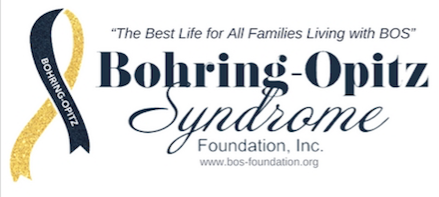Introducing the latest three members of our Medical Advisory Board!
The Bohring-Opitz Foundation is proud to introduce the latest three members of our Medical Advisory Board. These clinicians are excited to lend their expertise to researching Bohring-Opitz Syndrome. We hope that working alongside our foundation, we will be able to offer more support and understanding of the syndrome to our members and families.
First, we would like to introduce Dr. Samantha Vergano who is a Clinical Geneticist at The Children’s Hospital of The King’s Daughters in Norfolk, Virginia. There Dr. Vergano is the Division Director of Medical Genetics and Metabolism. Her primary research interests include Coffin-Siris syndrome and the utilization of electronic medical tools for improving detection of infants with hyperammonemia.
Dr. Vergano stated she is pleased to be joining the Foundation’s Medical Advisory Board “as it gives me a chance, as a clinician, to learn more about the condition and become close with families with children with BOS, and also gives me the ability to teach other clinicians about the syndrome, work towards better therapeutic treatments, and improve their potential for development and quality of life.”
Next, we would like to introduce Benjamin Helm, a Certified Genetic Counselor at the Indiana University School of Medicine & Riley Hospital for Children in Indianapolis, Indiana. Mr. Helm is a certified genetic counselor currently specializing in cardiovascular genetics, however he has significant experience working with patients and families with rare genetic diseases. Rare diseases are an active interest for him, and he continues to work with advocacy and support groups in his spare time. He helps families navigate the genetic testing process, has provided genetic counseling for rare disorders, advocates for families, and provides psychosocial support to patients and families throughout the process. Ben developed an interest in Bohring-Opitz syndrome after working with a family in his previous work in Virginia. He hopes to help raise awareness and motivate research for rare genetic conditions, and he also hopes to help shed light on the integral role of genetic counselors in this area.
When asked what drew Mr. Helm to his involvement with the Medical Advisory board, he told us that rare diseases often go unnoticed by the general population as well as in healthcare and scientific communities. As a result, many patients and families feel isolated and lost without advocates. It will require motivated patients, families, healthcare providers, and researchers to change this. His reasons for serving on the BOS Medical Advisory Board are multiple: to serve as an advocate and to increase awareness for BOS and other rare diseases; to be a resource to patients and families with BOS with new diagnoses; to interact with others in the MAB to motivate research so we can learn more about BOS and hopefully help current and future patients; to help highlight genetic testing and genetic counseling advocacy for rare diseases. Mr. Helm states, “I cherish the opportunity to address psychosocial needs of patients and families as a team.”
Our third clinician is Dr. Omar Abdel-Wahab at Memorial Sloan-Kettering Cancer Center in New York City. Dr. Abdel-Wahab is a hematologist/oncologist and Assistant Attending Physician on the Leukemia Service at Memorial Sloan-Kettering Cancer Center. His laboratory focuses on the functional understanding of genetic alterations in patients with chronic myeloid and lymphoid leukemias. One of his main areas of interest is in understanding the role of mutations in the ASXL1 gene and other ASXL family members in cancer and developmental disorders such as Bohring-Opitz Syndrome.
Dr. Abdel-Wahab is honored and excited to serve on the BOS Medical Advisory Board because he is very interested in understanding the genetic causes of BOS. As an adult leukemia doctor and researcher of the genetics of leukemia, he learned several years ago that the gene that is mutated in many patients with BOS (a gene called ASXL1) is also commonly mutated in the blood of adult patients with certain kinds of leukemia. His lab is devoted to understanding what this gene does and identifying treatments to correct the abnormalities present in ASXL1-mutant cells. He believes there is a lot we can learn about BOS that will also be very important for adults with leukemia.
We feel honored to have such experienced researchers and clinicians on our Medical Advisory Board. We hope that having such a valuable board working alongside the foundation will help our families affected by BOS feel that they have strong voices within the medical community to advocate for their loved ones.
Click here to learn more about the other members of the Medical Advisory Board.

